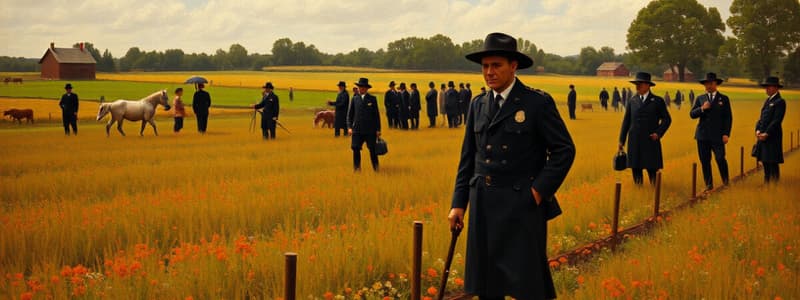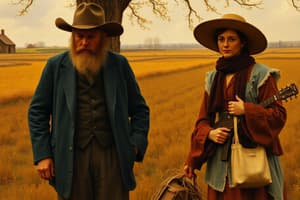Podcast
Questions and Answers
What was one of the initial responses of American farmers to the political and economic challenges they faced during the Gilded Age?
What was one of the initial responses of American farmers to the political and economic challenges they faced during the Gilded Age?
- They created the Granger movement. (correct)
- They engaged in mass protests against industrial policies.
- They lobbied for federal subsidies for crops.
- They formed labor unions to demand higher wages.
What was a key goal of the Populist Party?
What was a key goal of the Populist Party?
- Implement a graduated income tax. (correct)
- Support a strong military presence in rural areas.
- Establish a national bank to regulate currency.
- Outlaw the use of silver in currency.
What impact did the Supreme Court case in 1886 have on the Granger laws?
What impact did the Supreme Court case in 1886 have on the Granger laws?
- It declared the laws unconstitutional, limiting their effectiveness. (correct)
- It strengthened the laws, allowing farmers more rights.
- It led to the expansion of Granger laws to additional states.
- It upheld the laws, ensuring their enforcement.
Who was the Populist candidate in the 1892 presidential election?
Who was the Populist candidate in the 1892 presidential election?
What issue did William Jennings Bryan co-opt in the 1896 election?
What issue did William Jennings Bryan co-opt in the 1896 election?
Flashcards are hidden until you start studying
Study Notes
Economic Challenges for Farmers
- During the Gilded Age, American farmers faced severe political and economic hardships as federal policies favored industrial growth.
- Prices for agricultural goods fell significantly due to international economic pressures affecting market dynamics.
Farmers' Organizing Efforts
- Farmers initially organized through the Granger movement, focusing on community and cooperative efforts to enhance their bargaining power.
- This movement evolved into the more politically focused Farmers' Alliances, which aimed to address monopolistic pricing by railroads and exploitative federal policies.
Legal and Political Ramifications
- Granger laws, designed to protect farmers' interests at the state level, were struck down by a Supreme Court ruling in 1886, limiting state intervention.
- The setback led to a search for national reform, culminating in the formation of the Populist Party, which sought broader systemic changes.
Goals of the Populist Party
- The Populist Party advocated for the free coinage of silver to increase currency supply and facilitate debt relief for farmers.
- Other reform goals included implementing a graduated income tax and establishing direct election of U.S. senators to enhance democratic representation.
Election Outcomes
- In the 1892 presidential election, Populist candidate James Weaver garnered over 8% of the vote, indicating a growing support for the Party's platform.
- The emergence of the free silver issue significantly influenced the political landscape, ultimately leading to Democratic candidate William Jennings Bryan adopting it during the 1896 election.
Decline of the Populist Movement
- The co-opting of the Populist agenda by the Democratic Party, particularly through Bryan's nomination, marked the decline of a distinct Populist movement and the integration of their goals into broader political discourse.
Studying That Suits You
Use AI to generate personalized quizzes and flashcards to suit your learning preferences.




